ALL TOMORROW’S PARTIES USA 2012
Pier 36
East River between Manhattan & Brooklyn Bridges
September 21-23, $60-$75 per day, three-day pass $199
www.atpfestival.com
At long last, after more than ten years, the ATP festival is finally coming to New York City. All Tomorrow’s Parties, the international music festival that has taken place in the UK, Australia, Asbury Park, and the Catskills, will be presenting I’ll Be Your Mirror this weekend at Pier 36 on the East River between the Brooklyn and Manhattan Bridges. Past ATP festivals have been curated by the likes of Sonic Youth, Pavement, Portishead, Mogwai, the Breeders, Matt Groening, Modest Mouse, the Flaming Lips, and Nick Cave and the Bad Seeds; taking the reins at IBYM 2012 is Greg Dulli, leader of the recently reunited Afghan Whigs, who has invited friends and colleagues to participate from all over the musical map. Things get going on Friday with Frank Ocean, Philip Glass and Tyondai Braxton, Janeane Garofalo, Lightning Bolt, Lee Ranaldo’s “Hanging Guitar,” Hannibal Buress, DJ Edan, and Kurt Braunohler. Saturday’s schedule includes the Afghan Whigs, the Roots, José González, the Mark Lanegan Band, Dirty Three, the Antlers, JEFF the Brotherhood, the Dirtbombs, Scrawl, Emeralds, Vetiver, Afterhours, Charles Bradley and the Extraordinaires, Joseph Arthur, and DJ Questlove, while Sunday’s roster consists of Godspeed You! Black Emperor, the Make-Up, Hot Snakes, the Magic Band, Autolux, Thee Oh Sees, Lee Ranaldo, the Album Leaf, BRAIDS, Quintron and Miss Pussycat, Tall Firs, Blanck Mass, the Psychic Paramount, Endless Boogie, Demdike Stare, and DJ Jonathan Toubin. In addition, Criterion and Dulli have come up with a great selection of films that will be shown during the weekend, with Quadrophenia on Friday, The Night of the Hunter, Something Wild, The King of Marvin Gardens, and Dazed & Confused on Saturday, and Big Star: Nothing Can Hurt Me, Paul Fejos’s Lonesome, The Royal Tenenbaums, Eating Raoul, and Harold & Maude on Sunday. Dulli has also recommended a handful of books, some of which will be highlighted on the Lapham’s Quarterly Literary Stage: James Ellroy’s The Black Dahlia, Steve Toltz’s A Fraction of the Whole, Denis Johnson’s Nobody Move, Katherine Dunn’s Geek Love, and Joan Didion’s Play It as It Lays, with Evan Michelson and Mike Zohn of Oddities talking about Geek Love on Saturday and Julie Klausner of How Was Your Week discussing Play It as It Lays on Sunday. To get in the mood, you can check out Dulli’s festival mixtape here.
 Barry Levinson’s poignant drama follows the trials and tribulations of the Krichinsky family, Polish immigrants trying to make a life in America. The third in Levinson’s Baltimore series (following 1982’s Diner and 1987’s Tin Men and preceding 1999’s Liberty Heights), Avalon is heart-wrenchingly beautiful, led by a sweet, innocent performance by Armin Mueller-Stahl as Sam Krichinsky, the family patriarch, and Aidan Quinn as the son who has different dreams. The outstanding cast also includes Elijah Wood, Elizabeth Perkins, Kevin Pollak, Joan Plowright, and the great Lou Jacobi as Gabriel Krichinsky, who has a hysterical Thanksgiving Day fight with his brother Sam. One of the most tender and moving multigenerational dramas of the last few decades, Avalon is screening on September 22 as part of the Museum of the Moving Image’s “Film After Film” series, a collection of works selected by J. Hoberman focusing on how digital technology is changing the way movies are both made and viewed.
Barry Levinson’s poignant drama follows the trials and tribulations of the Krichinsky family, Polish immigrants trying to make a life in America. The third in Levinson’s Baltimore series (following 1982’s Diner and 1987’s Tin Men and preceding 1999’s Liberty Heights), Avalon is heart-wrenchingly beautiful, led by a sweet, innocent performance by Armin Mueller-Stahl as Sam Krichinsky, the family patriarch, and Aidan Quinn as the son who has different dreams. The outstanding cast also includes Elijah Wood, Elizabeth Perkins, Kevin Pollak, Joan Plowright, and the great Lou Jacobi as Gabriel Krichinsky, who has a hysterical Thanksgiving Day fight with his brother Sam. One of the most tender and moving multigenerational dramas of the last few decades, Avalon is screening on September 22 as part of the Museum of the Moving Image’s “Film After Film” series, a collection of works selected by J. Hoberman focusing on how digital technology is changing the way movies are both made and viewed.
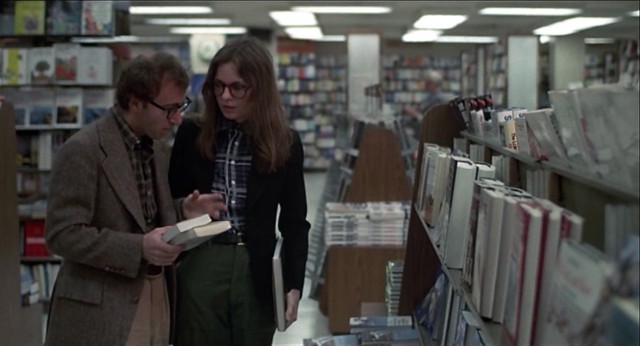
 “I feel that life is divided into the horrible and the miserable. That’s the two categories,” says Alvy Singer (Woody Allen) in Annie Hall. “The horrible are like, I don’t know, terminal cases, you know, and blind people, crippled. I don’t know how they get through life. It’s amazing to me. And the miserable is everyone else. So you should be thankful that you’re miserable, because that’s very lucky, to be miserable.” Allen’s classic 1977 Oscar-winning film — which had the working title “Anhedonia,” a medical term referring to the inability to experience pleasure — is one of the funniest, most-quoted romantic comedies in film history, a pure delight from start to finish. It’s ostensibly a luuuuuurve story about a nebbishy Jew and the ultimate WASPy goy (Diane Keaton as the title character), but it’s really about so much more: large vibrating eggs, right turns on red lights, television, Existential Motifs in Russian Literature, California, slippery crustaceans, driving through Plutonium, dead sharks, Freud, Hitler, Leopold and Loeb, religion, cocaine, Shakespeare in the Park, Buick-size spiders, planet Earth, and, well, la-di-da, la-di-da, la la. The film is screening on September 21 as part of the new Rubin Museum series “Happiness is…,” which consists of movies with a somewhat different idea of joy, including Alfred Hitchcock’s Strangers on a Train, Bob Rafelson’s Five Easy Pieces, Federico Fellini’s 8½, and Ingmar Bergman’s Cries and Whispers. Part of the larger Rubin program “
“I feel that life is divided into the horrible and the miserable. That’s the two categories,” says Alvy Singer (Woody Allen) in Annie Hall. “The horrible are like, I don’t know, terminal cases, you know, and blind people, crippled. I don’t know how they get through life. It’s amazing to me. And the miserable is everyone else. So you should be thankful that you’re miserable, because that’s very lucky, to be miserable.” Allen’s classic 1977 Oscar-winning film — which had the working title “Anhedonia,” a medical term referring to the inability to experience pleasure — is one of the funniest, most-quoted romantic comedies in film history, a pure delight from start to finish. It’s ostensibly a luuuuuurve story about a nebbishy Jew and the ultimate WASPy goy (Diane Keaton as the title character), but it’s really about so much more: large vibrating eggs, right turns on red lights, television, Existential Motifs in Russian Literature, California, slippery crustaceans, driving through Plutonium, dead sharks, Freud, Hitler, Leopold and Loeb, religion, cocaine, Shakespeare in the Park, Buick-size spiders, planet Earth, and, well, la-di-da, la-di-da, la la. The film is screening on September 21 as part of the new Rubin Museum series “Happiness is…,” which consists of movies with a somewhat different idea of joy, including Alfred Hitchcock’s Strangers on a Train, Bob Rafelson’s Five Easy Pieces, Federico Fellini’s 8½, and Ingmar Bergman’s Cries and Whispers. Part of the larger Rubin program “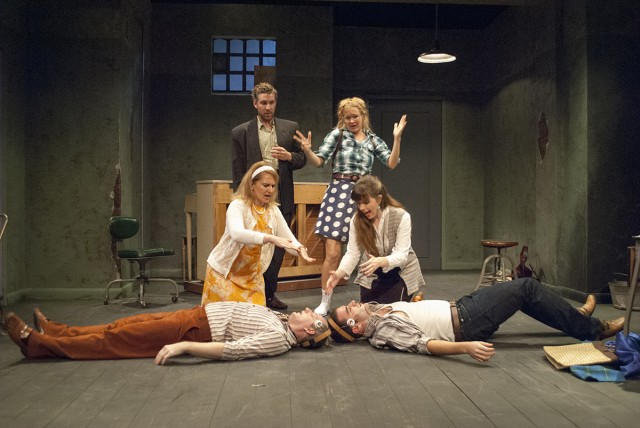
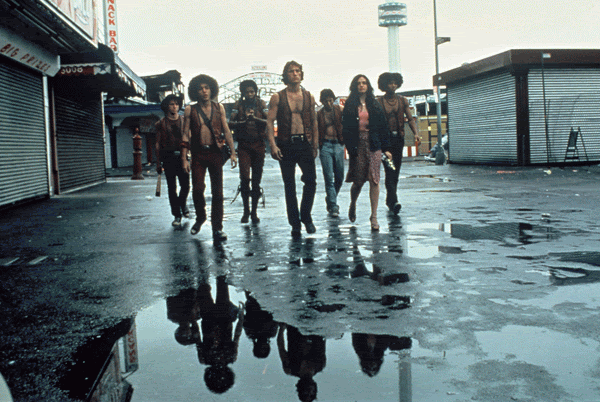
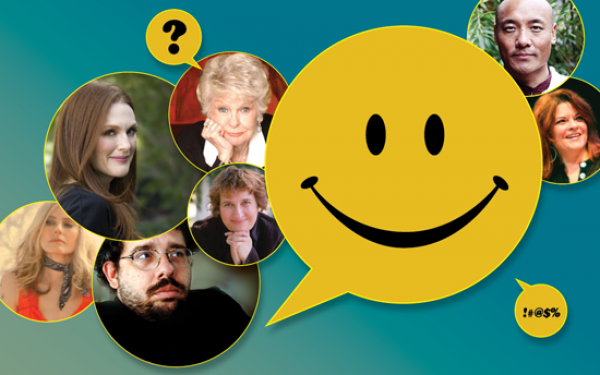
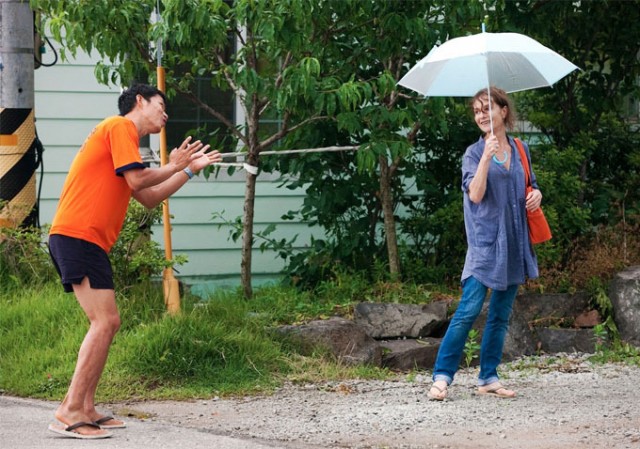
 Korean auteur Hong Sang-soo continues his fascinating exploration of cinematic narrative in In Another Country, although this one turns somewhat nasty and tiresome by the end. After being duped in a bad business deal by a family member, an older woman (Youn Yuh-jung) and her daughter, Wonju (Jung Yumi), move to the small seaside town of Mohjang, where the disenchanted Wonju decides to write a screenplay to deal with her frustration. Based on an actual experience she had, she writes three tales in which a French woman named Anne (each played by an English-speaking Isabelle Huppert) comes to the town for different reasons. In the first section, Anne is a prominent filmmaker invited by Korean director Jungsoo (Kwon Hye-hyo), who has a thing for her even though he is about to become a father with his very suspicious wife, Kumhee (Moon So-ri). In the second story, Anne, a woman married to a wealthy CEO, has come to Mohjang to continue her affair with a well-known director, Munsoo (Moon Sung-keun), who is careful that the two are not seen together in public. And in the final part, Anne, whose husband recently left her for a young Korean woman, has arrived in Mohjang with an older friend (Youn), seeking to rediscover herself. In all three stories, Anne searches for a lighthouse, as if that could shine a light on her future, and meets up with a goofy lifeguard (Yu Jun-sang) who offers the possibility of sex, but each Anne reacts in different ways to his advances. Dialogue and scenes repeat, with slight adjustments made based on the different versions of Anne, investigating character, identity, and desire both in film and in real life. Hong wrote the film specifically for Huppert, who is charming and delightful in the first two sections before turning ugly in the third as Anne suddenly becomes annoying, selfish, and irritating, the plot taking hard-to-believe twists that nearly undermine what has gone on before. As he has done in such previous films as
Korean auteur Hong Sang-soo continues his fascinating exploration of cinematic narrative in In Another Country, although this one turns somewhat nasty and tiresome by the end. After being duped in a bad business deal by a family member, an older woman (Youn Yuh-jung) and her daughter, Wonju (Jung Yumi), move to the small seaside town of Mohjang, where the disenchanted Wonju decides to write a screenplay to deal with her frustration. Based on an actual experience she had, she writes three tales in which a French woman named Anne (each played by an English-speaking Isabelle Huppert) comes to the town for different reasons. In the first section, Anne is a prominent filmmaker invited by Korean director Jungsoo (Kwon Hye-hyo), who has a thing for her even though he is about to become a father with his very suspicious wife, Kumhee (Moon So-ri). In the second story, Anne, a woman married to a wealthy CEO, has come to Mohjang to continue her affair with a well-known director, Munsoo (Moon Sung-keun), who is careful that the two are not seen together in public. And in the final part, Anne, whose husband recently left her for a young Korean woman, has arrived in Mohjang with an older friend (Youn), seeking to rediscover herself. In all three stories, Anne searches for a lighthouse, as if that could shine a light on her future, and meets up with a goofy lifeguard (Yu Jun-sang) who offers the possibility of sex, but each Anne reacts in different ways to his advances. Dialogue and scenes repeat, with slight adjustments made based on the different versions of Anne, investigating character, identity, and desire both in film and in real life. Hong wrote the film specifically for Huppert, who is charming and delightful in the first two sections before turning ugly in the third as Anne suddenly becomes annoying, selfish, and irritating, the plot taking hard-to-believe twists that nearly undermine what has gone on before. As he has done in such previous films as